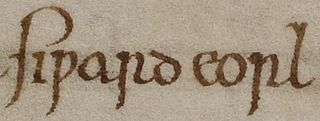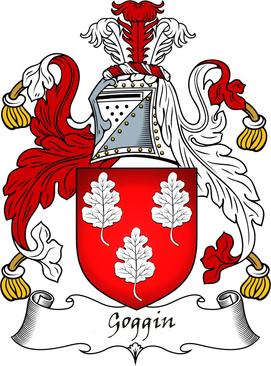Surname
- Alphonse Osbert (1857-1939), French painter
- William Fitz Osbert (died 1196), champion of the poor in London
Osbert is a male Germanic given name and a surname, composed of the elements ans/os "god", and berht "bright".
It may refer to:
Carew is a Welsh and Cornish habitation-type surname; it has also been used as a synonym for the Irish patronymic Ó Corráin. Carey can be a variant.
Fitzwilliam, lit. "(bastard) Son of William", is derived from the Anglo-Norman prefix Fitz often used in patronymic surnames of Anglo-Norman origin; that is to say originating in the 11th century ; and from William, lit. "Willpower/Desire Protector", which is a popular given name of old Germanic origin, became very popular in the English language after the Norman conquest of England in 1066, and remained so throughout the Middle Ages and into the modern era). While more popular as a surname, it does have some popularity as a given name.
Fulk is an old European personal name, probably deriving from the Germanic folk. It is cognate with the French Foulques, the German Volk, the Italian Fulco and the Swedish Folke, along with other variants such as Fulke, Foulkes, Fulko, Folco, Folquet, and so on.
Aubrey is a traditionally male English given name. It was quite common in the Middle Ages, but had lost favour for a time before experiencing a resurgence of popularity in the 19th century.

Siward or Sigurd was an important earl of 11th-century northern England. The Old Norse nickname Digri and its Latin translation Grossus are given to him by near-contemporary texts. It is possible Siward may have been of Scandinavian or Anglo-Scandinavian origin, perhaps a relative of Earl Ulf, although this is speculative. He emerged as a regional strongman in England during the reign of Cnut. Cnut was a Scandinavian ruler who conquered most of England in the 1010s, and Siward was one of many Scandinavians who came to England in the aftermath, rising to become sub-ruler of most of northern England. From 1033 at the latest, he was in control of southern Northumbria, present-day Yorkshire, governing as earl on Cnut's behalf.
Gospatric or Cospatric, , was Earl of Northumbria, or of Bernicia, and later lord of sizable estates around Dunbar. His male-line descendants held the Earldom of Dunbar, later known as the Earldom of March, in south-east Scotland until 1435, and the Lordship and Earldom of Home from 1473 until the present day.
Piers is an old English given name and surname, and has the same origins as Peter. Its meaning is 'rock, stone'.
Mordaunt is both a surname and a given name. Notable people with the name include:
Clement was a 13th-century Dominican friar who was the first member of the Dominican Order in Britain and Ireland to become a bishop. In 1233, he was selected to lead the ailing diocese of Dunblane in Scotland, and faced a struggle to bring the bishopric of Dunblane to financial viability. This involved many negotiations with the powerful religious institutions and secular authorities which had acquired control of the revenue that would normally have been the entitlement of Clement's bishopric. The negotiations proved difficult, forcing Clement to visit the papal court in Rome. While not achieving all of his aims, Clement succeeded in saving the bishopric from relocation to Inchaffray Abbey. He also regained enough revenue to begin work on the new Dunblane Cathedral.
Fitzmaurice is a Hiberno-Norman, Cambro-Norman, Anglo-Norman surname. It is patronymic as the prefix Fitz-
derives from the Latin filius, meaning "son of".
Fitz was a patronymic indicator used in Anglo-Norman England to help distinguish individuals by identifying their immediate predecessors. Meaning "son of", it would precede the father's forename, or less commonly a title held by the father. In rare cases, it formed part of a matronymic to associate the bearer with a more prominent mother. Convention among modern historians is to represent the word as fitz, but in the original Norman French documentation, it appears as fiz, filz, or similar forms, deriving from the Old French noun filz, fiz, meaning "son of", and ultimately from Latin filius (son). Its use during the period of English surname adoption led to its incorporation into patronymic surnames, and at later periods this form was adopted by English kings for the surnames given some of their recognized illegitimate children, and by Irish families when anglicizing their Gaelic patronymic surnames.

de Burgh is an Anglo-Norman surname deriving from the ancient Anglo-Norman and Hiberno-Norman noble dynasty, the House of Burgh. In Ireland, the descendants of William de Burgh (c.1160–1206) had the surname de Burgh which was gaelicised in Irish as de Búrca and over the centuries became Búrc then Burke and Bourke.
Giffard is an Anglo-Norman surname, carried by a number of families of the Peerage of the United Kingdom and the landed gentry. They included the Earls of Halsbury and the Giffards of Chillington Hall, Staffordshire. Notable people with the surname include:

Goggin is a surname.
Osbeorn, also spelled Osbjorn and Osbert, given the nickname Bulax, was the son of Siward, Earl of Northumbria. He is one of two known sons of Siward, believed to be the elder. While it is normally assumed he was the son of Siward's Bamburgh wife Ælfflæd, it has been suggested by William Kapelle that Osbeorn's mother was not Ælfflæd. The nickname "Bulax" probably represents the Old Norse term for "Poleaxe".
Osbern is a given name. Variants include Osbearn and Osbarn.
Siward Barn was an 11th-century English thegn and landowner-warrior. He appears in the extant sources in the period following the Norman Conquest of England, joining the northern resistance to William the Conqueror by the end of the 1060s. Siward's resistance continued until his capture on the Isle of Ely alongside Æthelwine, Bishop of Durham, Earl Morcar, and Hereward as cited in the Anglo-Saxon Chronicle. Siward and his confiscated properties in central and northern England were mentioned in Domesday Book, and from this it is clear that he was one of the main antecessors of Henry de Ferrers, father of Robert de Ferrers, the first Earl of Derby.
Thurbrand, nicknamed "the Hold", was a Northumbrian magnate in the early 11th century. Perhaps based in Holderness and East Yorkshire, Thurbrand was recorded as the killer of Uhtred the Bold, Earl of Northumbria. The killing appears to have been part of the war between Sweyn Forkbeard and Cnut the Great against the English king Æthelred the Unready, Uhtred being the latter's chief Northumbrian supporter. Thurbrand may also have attested a charter of 1009 and given a horse to Æthelred's son Æthelstan Ætheling. The killing is the first-known act, if it did not initiate, a bloodfeud between Thurbrand's family and Uhtred going into the time of Earl Waltheof. It is possible that Holderness took its name because of Thurbrand's presence or ownership of the peninsula.
Clare is a surname of English or Irish origin. The name is most often derived from the titular de Clare first held by Richard fitz Gilbert, a Welsh lord from a Norman family, who took it from Clare, Suffolk. The name is also prevalent among families of Irish origin, both from de Clare and from etymologically unrelated place names such as Clare County, Clare Island and River Clare in Ireland which attests to a long historical relationship with those places.